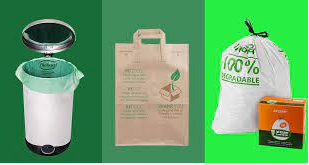Biodegradable Garbage Bags
As consumers expect more things like plastic in the ocean and lapis lazuli in abundance, many are looking for ways to clean up their carbon footprint and use Biodegradable Garbage Bags. It’s easier to use and maintain your home by switching from plastic bottles to compostable garbage bags. Although it is not an easy solution, it has many significant advantages that it usually has.

Whether you want a big cuckoo lap bag or a small cheeky bin on the counter, this toy box has our pick of the five best lapis bags. Market today. As consumers look forward to things like an abundance of plastic in the ocean and lapis lazuli, more and more people are looking for ways to reduce their carbon footprint.
It’s easier to use and maintain your home by switching from plastic bottles to compostable garbage bags. Although it is not an easy solution, it has many significant advantages that it usually has.
Whether you want a large lapis bag for your cuckoo or a short one for a cheeky sink on the counter, this toy box has our pick of the five best lapis bags. Market today
Also Read:
- Waste to Energy- Its Projects and implementations
- What is an Environmental Law- Regulations of Law
- What is Global Warming, Definitions and its Effects
Why Switch Biodegradable Garbage Bags?
According to the Center for Biological Diversity, plastic bags take up to 1,000 years to decompose in a landfill. And when bottles break down, they can release toxic substances and microplastics into the environment. It’s hard to give up plastic, but by switching to products like biodegradable trash bags, we can take simple steps to reduce our carbon footprint.
Although biodegradable and recyclable plastic takes longer to break down in a landfill than in the open air, it can be more environmentally friendly than using traditional plastic bags. Below are some reasons why you might want to consider replacing plastic bags with other eco-friendly options.
Biodegradable bags emit less greenhouse gas over their lifetime because the plants they’re made from (usually corn or sucrose) absorb carbon as they grow. This removes the carbon produced when the carbon breaks down. One study even found that switching to corn-based bioplastics could reduce the US population by 10%.
Biodegradable and compostable trash bags break down 1000 times faster than regular trash bags in the right environment. Biodegradable bags begin their decomposition process when they come into contact with moisture or organisms such as bacteria and fungi. Carrier bags break down faster than traditional bags, but often require more heat to break down, so they should be sent to composting facilities.
Compostable bags are completely biodegradable and do not turn into microplastics like regular plastics and other compostable bags containing bioplastics.
Bioplastic also has some disadvantages. For example, crops that can be converted into bioplastics require a lot of land, water and pesticides to grow. It can also decompose and release methane if there is not enough oxygen during the decomposition. But most greenhouses in the U.S. today are closed to prevent these and other harmful substances from entering the atmosphere.
According to Kartik Chandra, a professor in Columbia University’s Department of Earth and Environment, bioplastics represent a vast improvement over conventional plastics. But is the final decision yours?
Yes, the most sustainable option is to reduce waste by putting the waste in vacuum cleaners and washing them empty. Cooking is another way to reduce your contribution to pollution, whether you live in an apartment or house.
5 Best Biodegradable Trash Bags
If you decide to buy biodegradable garbage bags, it is important to note that not all garbage bags can be destroyed in a reasonable amount of time. Depending on the material, making a biodegradable bag can be more than just greenwashing.
To advise you in a sustainable way, we take into account the following factors when choosing the best biodegradable waste bags:
Status: What goes in the bag? Is it about plants? These are some Modern Engineering, Inc. (EPI) that accelerate the degradation of plastic.
Certifications: Are the bags certified for compostability and biodegradability according to ASTM (American Society for Testing and Materials) standards?
Expiration rate: how long does it take for every business bag to deteriorate? (Depending on the brand, this can take anywhere from six months to more than a year.)
Durability: are the bags as strong as traditional trash cans? Or does it break or lose easily?
Packaging: Does the product have compact and reusable packaging?
Customer Satisfaction: Are our customers satisfied with the product? (We review verified reviews and have conducted independent reviews of selected products).